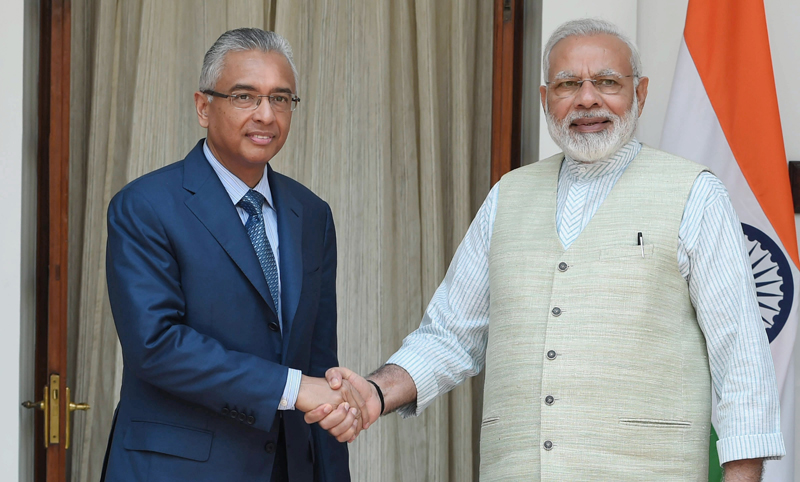Mauritius, a springboard for Indian businesses to invest in Africa
Share

India and Mauritius share strong political, economic and trade relations. The two countries have entered into a new phase of economic cooperation following the revision of the DTAC in May 2016 and the resumption of CECPA talks in September 2016.
India and Mauritius have a history of close economic and commercial relations. In financial year 2016-2017, India exported goods worth US$ 883 million to Mauritius and imported goods worth US$ 18 million from Mauritius. India’s exports to Mauritius comprise largely petroleum pro-ducts, and also pharmaceuticals, cereals, cotton, electrical machinery, apparel and clothing accessories. The main items of Mauritius’ exports to India are iron and steel, precious/semi-precious stones and optical, photographic and precision instruments.
“However, there is considerable untapped potential,” says Abhay Thakur, High Commissioner of India in Mauritius. “After the signing of DTAC amendment Protocol, talks on a Comprehensive Economic Cooperation Agreement (CECPA) commenced in September 2016 and are expected to be concluded by the end of 2017. CECPA will cover trade in goods and services, investment cooperation and wider business linkages to our mutual economic benefit and usher in a new phase of economic cooperation,” he added.
Concerning the talks, Business chambers on both sides recently decided to revive the Joint Business Council. Both parties are discussing various aspects like trade in goods, services, investment and general economic cooperation in the CEC-PA framework and inputs from businesses on both sides will be very useful for the CECPA talks.
“India looks at Mauritius through the matrix of strong links of history, kinship and culture. Therefore, we are always happy to associate ourselves with priority projects of Mauritius,” adds Abhay Thakur. Indeed, under the Special Economic Package (SEP) of USD 353 million, India is currently providing grant assistance to five major projects, namely, the Metro Express, the new Supreme Court building, a new ENT Hospital, social housing and supply of digital tablets to primary school children. India is also constructing the new building of the World Hindi Secretariat in Mauritius and is providing grant assistance for the construction of a new Civil Service College in Mauritius.
In addition, a USD 500 million line of credit was extended to Mauritius in May 2017 during the visit of Pravind Jugnauth to India. It will be used for a range of projects in areas like water, energy, health, housing and a new administrative building, in addition to any financing gap for the above SEP projects.
“India and Mauritius are now looking forward to comprehensive, multi-sectoral economic cooperation in a constructive and transparent manner, without any apprehensions of treaty abuse. The strategic location of Mauritius and our special and unique ties give Mauritius an advantage to act as a hub for Indian businesses planning to cater to African markets in areas such as financial services, pharmaceuticals and healthcare, bunkering hub, logistics and maritime services. Indian corporate sector will do its due diligence; clearly there is much benefit to be derived from a presence in Mauritius,” points out Abhay Thakur.
Strong mutual cooperation
Furthermore, some Indian Public Sector Enterprises are currently functioning in Mauritius. The Bank of Baroda, Life Insurance Corporation of India and New India Assurance Corporation were the first to establish operations, followed by others which include India Handloom House, Telecommunications Consultant India Ltd, IndianOil (Mauritius) Limited (IOML), Mahanagar Telephone (Mauritius) Ltd and State Bank of India (Mauritius) Limited.
Some high-visibility Indian-assisted projects in Mauritius are, among others, the Mahatma Gandhi Institute, the Jawaharlal Nehru Hospital, the Rajiv Gandhi Science Centre and the Rabindranath Tagore Institute. Prestigious symbols of recent Indian assistance include the Cyber Tower at Ebène and the Swami Vivekananda International Conference Centre. The Offshore Patrol Vessel Barracuda, built by an Indian shipyard under a Government of India Line of Credit, was commissioned into the Mauritian National Coast Guard during the visit of Indian Prime Minister NarendrModi in March 2015. India also provides extensive capacity building and training inputs to the Mauritian armed forces, besides carrying out regular joint patrolling/surveillance exercises in the Mauritian EEZ. India has also provided assistance in the setting up of Mauritius’s National Hydrographic Unit.
During the visit of Pravind Jugnauth in India, in May 2017, both Mauritius and India agreed that effective management of conventional and non-conventional threats in the Indian Ocean is essential to pursue economic opportunities. Therefore, it is expected that the bilateral Maritime Security Agreement between the two countries will strengthen mutual cooperation and capacities. Mauritius and India have also agreed to further strengthen their wide-ranging cooperation in hydrography for a secure and peaceful maritime domain. India is thus supporting the National Coast Guard of Mauritius in augmenting its capacity through Project Trident. Decision has also been taken to renew the life of the Coast Guard Ship Guardian that was provided to Mauritius under a grant assistance programme.
For Deven Coopoosamy, Partner - Client Relationship Corporate of Rogers Capital, it is very important for Mauritius and India to both understand and take advantage of India’s strategic initiatives to preserve its influence in the Indian Ocean through the “Spice Route”. India is aggressively catching up with growth in emerging African economies as in many sectors Africa is today where the Indian market was a few years back. Indian companies are finding an advantage in understanding the market and introducing products and technologies that suit local needs. “This is exactly where Mauritius, always known as the Star and Key of the Indian Ocean, fits in India’s Africa Strategy. The Mauritius Board of Investment and the Financial Services Promotion Agency are playing a key role by working in close collaboration with extant bodies and forums but alongside promoting the creation of new cooperative platforms to showcase the fundamental capabilities of Mauritius to Indian investors would definitely encourage trade between the two countries,” he observes.
Investment opportunities
“India is a huge market. Demand in India keeps producers and manufacturers in Canada, US, Europe and China busy. Mauritian entrepreneurs should come forward and take advantage of this huge Indian demand. Mauritius exports garments, special sugar, rum, medical devices, processed tuna, etc. to India. Mauritian entrepreneurs should diversify their export basket to India and also focus on increasing volume of exports. Investors can invest in sectors such as ICT, healthcare, education, construction and professional services. Institutional investors can use GIFT city as a platform,” insists Abhay Thakur.
India highlights that they have one of the most liberal and transparent policies on Foreign Direct Investment (FDI) amongst the major economies of the world. 100% FDI is allowed under the automatic route in all sectors/activities except in few areas which require prior approval of the Government. Foreign Institutional Investors (FIIs) are allowed to invest in India in the securities trade in both primary and secondary capital markets. FIIs must register with Securities and Exchange Board of India (SEBI) and shall comply with the Exchange Control Regulations of the Reserve Bank of India (RBI).
On the other side, Indian investors have a very wide array of interests in Mauritius, spanning across sectors such as POL (petroleum, oil and lubricants) bunkering, port development, tourism, healthcare & pharmaceuticals, ICT, infrastructure and financial services. Other potential sectors include blue economy, renewable energy, education, film & media.
According to the High Commission of India in Mauritius, Indian companies are keen to tap into the potential of Mauritius as a gateway to Africa. The revision of the DTAC and revival of the CECPA talks have attracted the attention of Indian companies looking to do more business with Africa. Besides consolidation of India-Mauritius bilateral economic cooperation, the CECPA would help in exploring the viability of an India-Mauritius-Africa trade and investment corridor.
“India-Mauritius commercial relations today stand on a solid foundation, which will be further strengthened once the CECPA is in place. India has already accorded Most Favoured Nation (MFN+) status to Mauritius in its development assistance program and in tax matters, to give boost to bilateral trade and economic cooperation. Both countries need to diversify their trade baskets and focus on increasing volumes. In this context, there
is a tremendous scope for Made-in-India, Value-added-in-Mauritius products,” he added.
Mauritius has, effectively, a potential to become a hub for Indian businesses planning to do business in Africa, especially Eastern Africa. Mauritius is member of SADC and COMESA, which allow duty free transportation of goods from Mauritius to Eastern and Southern Africa. Transportation of goods from Mauritius to coastal African cities can at times be easier than internal transportation between them. Businesses based in Mauritius can gain access to special economic zones in Africa and enjoy an easier business travel regime. Hence, it could make sense for Indian companies to have an industrial base in Mauritius to cater to the demand of the African market.
DTAc: slowdown in investments
The Protocol for amendment of the Convention for the avoidance of double taxation and the prevention of fiscal evasion with respect to taxes on income and capital gains between India and Mauritius was signed on 10 May 2016. The Protocol tackles treaty abuse and round-tripping of funds attributed to the India-Mauritius treaty, curb revenue loss, prevent double non-taxation, streamline the flow of investment and stimulate the exchange of information. It also improves transparency in tax matters and will help curb tax evasion and tax avoidance. “Statistics show that there is no slowdown in investments due to the revision of India-Mauritius DTAC. Contrary to apprehensions, after DTAC revision, Mauritius has moved to a more stable footing as a jurisdiction that enjoys exceptional, MFN+ treatment from India in tax matters,” explains Abhay Thakur.
Deven Coopoosamy recalls that the India-Mauritius DTA was signed in August 1982 and became effective in December 1983. It was framed with the aim of strengthening the flow of investments between the two countries and also to allow Indian corporates to use Mauritius as a trading and investment platform to access Africa through the membership with the main African trading blocks. However, with the opening of the Indian economy in 1992, Mauritius has over the years emerged as its largest source of FDI and this valued mechanism has served both countries very well for the past 33 years.
“Nevertheless, any bilateral agreement between two countries are subject to renegotiation over the years. The long-awaited revision of the DTA, which happened in May 2016, has helped to bring clarity, certainty and transparency in tax matters which are among the key ingredients in investment strategies. In addition, it has given Mauritius a competitive edge as the preferred jurisdiction for debt investments into India over Singapore and Netherlands. At Rogers Capital, while we are still busy in structuring and setting up global business companies investing/trading in India, we are now seeing an increasing amount of interests from our Indian clients to structure their African businesses through Mauritius in various sectors ranging from infrastructure, pharmaceuticals, renewable energy to fast consumable goods. In my opinion, despite the amendment to the DTA, Mauritius will still continue to remain as a vibrant and strong international financial centre of substance for both inbound and outbound trading and investments for India,” highlights Deven Coopoosamy.
In March 2017, during the Travel & Tourism Seminar – Know India – held in Mauritius, Abhay Thakur noted that the people of Mauritius and India maintain very close contact and frequently travel to each other’s countries.
Not only are both India and Mauritius growing rapidly as attractive tourist destinations globally, but also that tourist exchanges between them are intensifying bilaterally. Globally, total foreign tourist arrivals into India in 2016 were 8.89 million, a growth of 10.7% over the arrivals in 2015 (8.03 million).
Similarly, total foreign tourist arrivals into Mauritius in 2016 was 1.27 million, a growth of 10.8% over the arrivals in 2015 of 1.15 million. So, both India and Mauritius tourist arrivals grew by well over 10% last year. Bilaterally, the number of Indian tourists coming into Mauritius in 2016 was 82,670, a growth of 14.6%, while the number of Mauritian tourists going to India in 2015 was 32,533, a growth of 16.4%. So the number of Indian and Mauritian citizens travelling to each other’s countries is also growing well, in the range of 15%.
Notwithstanding the 5,000 km distance that separate Mauritius and India, with growing prosperity in India and Mauritius, and growing propensity to travel, tourism is definitely one sector where both sides can and are doing more. Recent initiatives by Government of India like the e-Tourist Visa facility and the special dispensation for Mauritius for OCI (Overseas Citizen of India) cards would go a long way in further facilitating tourism exchanges between the two countries. Some of India’s special schemes are of great interest to Mauritians, who either seek spiritual rejuvenation through pilgrimage in India, or wish to re-discover their umbilical connect with India, or go for wellness treatment.
So, India offers a Pilgrimage Rejuvenation and Spiritual Augmentation Drive (PRASAD) scheme which aims at providing a complete religious and spiritual tourism experience. It covers sites such as Amaravati, Srisailam and Tirupati in Andhra Pradesh, Gaya and Patna in Bihar, Kanchipuram and Vellankani in Tamil Nadu and Trimbakeshwar in Maharashtra. Under the SwadeshDarshan scheme, thirteen thematic circuits have been identified including the North-East India Circuit, Buddhist Circuit, Himalayan Circuit, Coastal Circuit, Krishna Circuit, Desert Circuit, Tribal Circuit, Eco Circuit, Wildlife Circuit, Rural Circuit, Spiritual Circuit, Ramayana Circuit and Heritage Circuit. Air Mauritius is already flying to four destinations in India – New Delhi, Mumbai, Chennai and Bangalore – and it has been agreed to add Kolkata and Hyderabad. There is also interest in connecting to Goa as well.
The Indian High Commission has encouraged Mauritian travel companies to further develop their contacts with their Indian counterparts in order to utilize all the various avenues and options available.




